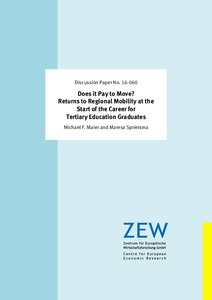Does it pay to move? Returns to regional mobility at the start of the career for tertiary education graduates
"Decisions taken at the start of one’s career have long-term consequences and one important decision graduates have to make is whether to be regionally mobile when looking for the first job. We investigate whether being regionally mobile for the first job following graduation rather than to sta...
| Main Authors: | , |
|---|---|
| Institution: | ETUI-European Trade Union Institute |
| Format: | TEXT |
| Language: | English |
| Published: |
Mannheim
2016
ZEW |
| Subjects: | |
| Online Access: | https://www.labourline.org/KENTIKA-19101310124919295929-Does-it-pay-to-move?-Returns-t.htm |
| Summary: | "Decisions taken at the start of one’s career have long-term consequences and one important decision graduates have to make is whether to be regionally mobile when looking for the first job. We investigate whether being regionally mobile for the first job following graduation rather than to stay in the place of graduation pays off. Existing research on regional mobility mostly focuses on job-to-job mobility. We analyse the determinants of early career mobility and estimate a bivariate probit model to account for the dependency between the migration decisions for tertiary education and for the first job. In order to account for self-selection with respect to migration decisions, we exploit variation in the availability of university places at the regional level. Our results show that there is significant dependency between migration decisions made before and after tertiary education. Secondly, using an IV estimation strategy, we find significantly positive wage returns to regional mobility for the first job." |
|---|---|
| Physical Description: | 25 p. Digital |

